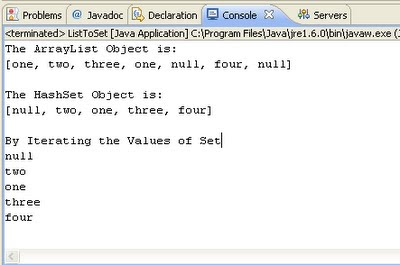Can i convert List to Set (or) ArrayList to HashSet ?
Yes.We can convert from List to Set.Both are under the same Superclass Collection Interface.So there are more chances to convert.
Actually ArrayList follows the insertion order of elements.When you tried to convert from ArrayList to HashSet it won't preserve the previous order, it may change according to the properties of HashSet.Set won't maintain the order of elements.
Here we are passing the reference of the List to HashSet constructor at the creation of set object.
Q). Why should i convert List to Set ?
A). To eleminate duplicate values and null values in the list.
In our program i have given duplicate values and nulls in list to convert into set.After that it shows with out duplicates.
Output of the above Program:
Reference books:




Actually ArrayList follows the insertion order of elements.When you tried to convert from ArrayList to HashSet it won't preserve the previous order, it may change according to the properties of HashSet.Set won't maintain the order of elements.
Here we are passing the reference of the List to HashSet constructor at the creation of set object.
Set<Object> set = new HashSet<Object>(list);
Q). Why should i convert List to Set ?
A). To eleminate duplicate values and null values in the list.
In our program i have given duplicate values and nulls in list to convert into set.After that it shows with out duplicates.
package javabynatarj.collections;
import java.util.ArrayList;
import java.util.HashSet;
import java.util.Iterator;
import java.util.List;
import java.util.Set;
public class ListToSet {
public static void main(String[] args) {
List<Object> list = new ArrayList<Object>();
list.add("one");
list.add("two");
list.add("three");
list.add("one");
list.add(null);
list.add("four");
list.add(null);
System.out.println("The ArrayList Object is:");
System.out.println(list+"\n");
Set<Object> set = new HashSet<Object>(list);
System.out.println("The HashSet Object is:");
System.out.println(set+"\n");
System.out.println("By Iterating the Values of Set");
Iterator<Object> it = set.iterator();
while(it.hasNext()){
System.out.println(it.next());
}
}
}
Output of the above Program:
Reference books:











+notes+Part-II_JavabynataraJ+copy.png)
